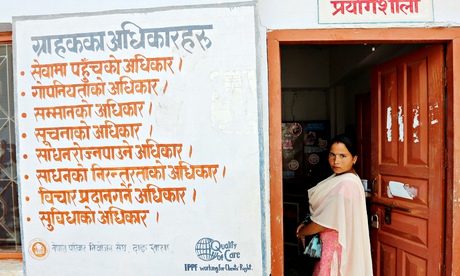Human Rights of Women
Source: The Guardian A landmark conference in Cairo 20 years ago that sought to put women's rights, empowerment and well-being at the centre of discussions about population growth and development has brought some change, but has not lived up to its promise, according to women's rights campaigners.
 As world leaders meet in New York on Monday to discuss progress on the agreement and seek to address future challenges, Noelene Nabulivou, from the organisation Diverse Voices and Action for Equality, said: "Here we are, 20 years later and there is still so much we need to do. Cairo didn't go far enough."
As world leaders meet in New York on Monday to discuss progress on the agreement and seek to address future challenges, Noelene Nabulivou, from the organisation Diverse Voices and Action for Equality, said: "Here we are, 20 years later and there is still so much we need to do. Cairo didn't go far enough."
The programme of action from the 1994 International Conference on Population and Development, held in the Egyptian capital, moved the debate about population growth away from the idea that it can be fixed solely through family planning, to see women's social and economic empowerment as key to sustainable development.
The outcome document contained 200 recommendations designed to uphold women's reproductive rights, improve access to decent reproductive healthcare, including family planning services and safe abortion, ensure access to quality education, address the needs of indigenous women, migrants, older women and those with disabilities, and support more economic opportunities for women.
Nabulivou said impressive gains in getting more girls into school, reducing poverty and addressing gender-based violence had been uneven and of varying quality.
"We have not got to the core of change. We need autonomy over our bodies, who we love, how we love, if we're able to make decisions about who we marry. Early and forced marriage is still an enormous problem."
Nabulivou said sexual and reproductive health and rights needed to be at the core of the sustainable development goals (SDGs) that will replace the millennium development goals (MDGs) when they expire next year.
Marisa Viana, from the Resurj, a global alliance of feminists under 40, said poor young women, black women and women from indigenous groups still find it difficult to have body autonomy and struggle to access services. She said the SDGs must focus on the health and rights of the growing number of adolescents.
"The Cairo programme of action was nearly perfect, but not quite. It did not include the central role and recognition of sexuality and its related human rights, it failed to address the centrality of preventing and treating HIV, and ignored the need for legislative reforms that would legalise safe abortion," she said.
"The proposed SDGs, like the MDGs before them, are missing a huge opportunity to prioritise the health and human rights of the largest generation of adolescents the world has every seen," she added. "Governments must provide adolescents with the information, knowledge, skills and health services."
Monday's eight-hour high-level meeting at UN headquarters will reaffirm government commitments to achieve the goals of Cairo and address the challenges that have emerged over the past 20 years, such as rapid urbanisation, climate change and increased migration, which need to be addressed in the SDGs.
The final draft of the SDGs produced by the UN open working group contains a standalone goal on women's empowerment, with a target to ensure universal access to sexual and reproductive health. The final set of goals is expected to be presented in September next year.
"Monday's meeting is a chance to recommit ourselves as a global community to take things forward and be able to do this within the constructs of the Cairo agenda, but also within the larger context of the post-2015 development agenda," said Babatunde Osotimehin, executive director of the UN population fund, UNFPA.
He added that both young and older people need better support. "I think we need to underscore the place of population dynamics ... Developing countries have a large number of young people who need access to education and health services and good governance and access to credit to be able to meet their full potential, so they can become entrepreneurs, create jobs for themselves and increase savings.
"On the other side are senior people ... who want to continue working, and have the skills and wisdom and ability to mentor young people, who can still contribute to national development and growth. We need to address the needs of both. I don't see that coming through as forcefully as we would like."
Osotimehin said he expected every member state to send a representative. A report from the president of the UN general assembly is expected to conclude the session.
Progress towards the Cairo agreement has been monitored yearly at the Commission on Population and Development, and more recently there have been specific regional conferences. The outcomes of these meetings have been fed into the SDG working group discussions.
Thomas Gass, assistant secretary general at the UN Department of Economic and Social Affairs, said the meeting comes at a critical time for member states. "It's a watershed moment," he said on Friday. "It will be an important opportunity to reinforce the centrality of population issues in the post-2015 agenda and place people at the heart of the sustainable development agenda." He pointed out that since the Cairo conference, the world's population had grown from 5.7 billion to 7.2 billion this year, and is predicted to increase to 9.6 billion by 2050.
